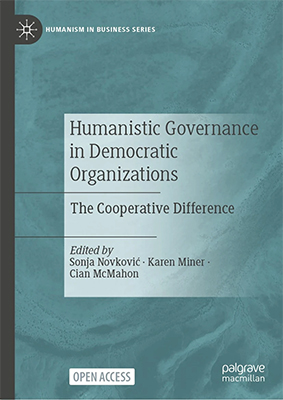This book, in open access, examines how corporate governance can integrate with humanistic management practices. Draws together international perspectives on cooperative governance. Edited by Sonja Novković, Karen Miner and Cian McMahon, the book builds on the research of the International Centre for Co-operative Management, at Saint Mary’s University, Canada.
As editors explain, governance of democratic member-owned enterprises is complex and context-dependent. Members typically engage with the enterprise as contributors to its operations, while they also jointly own and democratically control it in order to enable such engagement.
While member-owned and democratically governed organizations span from cooperatives and mutuals to associations and other voluntary sector organizations, of particular interest for the advancement of the literature on this subject is the cooperative enterprise, given a common definition of its boundaries provided in the Statement on the Cooperative Identity of the International Cooperative Alliance (ICA, 1995).
Governance in cooperatives as collective enterprises (MacPherson, 1996; Novkovic et al., 2022) is about promoting human dignity, democratic decision-making, and engagement (empowerment) of employees and other stakeholders. What is lacking is a better understanding of governance practices involved in implementing the humanistic paradigm and their implications. This book attempts to fill this gap. The aim of the project, then, is two-fold: one, to advance the theory of humanistic governance in democratic organizations and two, to showcase cooperative governance structures and processes that fit the humanistic paradigm perspective. While the first objective appeals to academic inquiry, the second goal aims to inform practice and assist in identifying systems and practices that curb degenerative isomorphic pressures on cooperative governance.
Starting from the premise that the humanistic paradigm and democratic governance in organizations go hand in hand, the book explores governance based on the intrinsic characteristics of cooperative enterprises, namely: being values-based; jointly owned and democratically controlled; and centred on peoples’ needs as producers, consumers, or workers. This allows to establish the basic parameters of humanistic governance systems applicable to cooperatives, as well as to the context of economic democracy more broadly.
Cooperative enterprise is a means of collective action through which members achieve their goals and aspirations, from decent work to access to markets and/or protection from market risks and speculative trading. The model therefore lends itself to the underlying assumptions of humanistic economics and management. In particular, behavioral assumptions behind a collective enterprise depart from the hyper-rational self-centred optimizer in neoclassical economics and align with bounded rationality, which considers human imperfections as well as empathy and solidarity in socio-economic/ecological affairs.
This volume also furthers the conceptualization of humanism in business through the inclusion of collectivist aspirations of the members of cooperative and social solidarity enterprises.
https://link.springer.com/book/10.1007/978-3-031-17403-2#about-this-book







